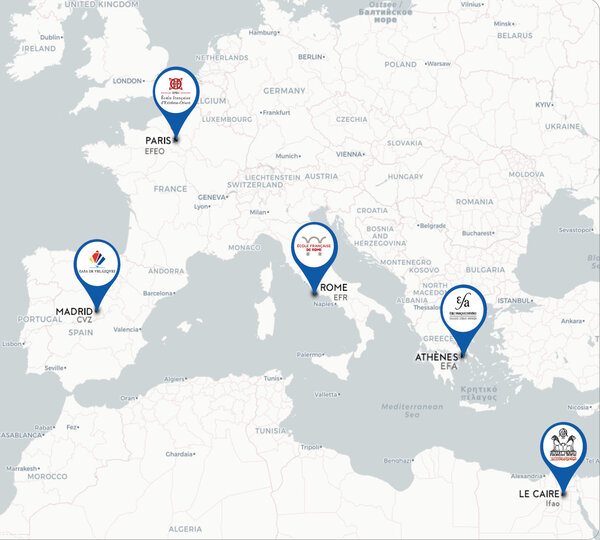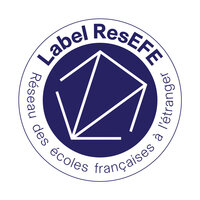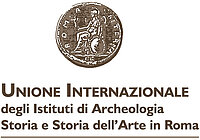The Écoles françaises à l'étranger (French Schools Overseas Network)
An Overview
The French Schools Overseas is a network of five institutions of higher education and research governed by the 2011--164 Decree of the 10 February 2011. Establish abroad, in Greece (French School at Athens, 1846), in Italy (French School at Rome, 1875), in Egypt (French Institute for Oriental Archaeology, Cairo, 1880), in Southeast Asia (French School of Asian Studies, Paris, 1898) and in Spain (Casa de Velázquez, Madrid, 1920), the Schools have a triple mission of education, research, and dissemination in the humanities and the social sciences. They host young researchers of doctoral or post-doctoral standing while also drawing on a community of more senior researchers, both French and non-French. Together the Schools publish approximately one hundred volumes each year. In their host countries, they develop networks of collaboration and cooperation, making them invaluable stakeholders in French research abroad. Since 2015, they have a committee of directors which oversees the network’s shared activities.
Visit the Website of the French Schools Overseas Network
Read the 2011--164 Decree (in french)
Missions
The French Schools Overseas carry out a mission of training, research, dissemination, and knowledge exchange.
The Schools are responsible for research training. To this end, they host doctoral students and post-doctoral scholars for varying periods and with a number of different possible stasuses: year-long members renewable one or two times, grant-holders of one month or longer, trainees on excavation sites, students in themed doctoral training seminars, or students possessing doctoral research contracts with a university. The Schools also provide work placements to young curators, archivists, librarians, architects or topographers, as well as publishing professionals, giving each the opportunity to work in an international professional environment.
In their host countries, the Schools develop - in line with a five-year research programme - research missions in numerous domains within the humanities and the social sciences: archaeology, history of art, history, religious sciences, philology, anthropology, ethnology or social sciences. Current and former members of the Schools, as well as their associate researchers, all participate in these missions. The Schools also have facilities for supporting visiting researchers as members, either one-year renewable (FSA, FSR, FIOA, and Casa) or permanent (FSAS); as researchers in residence for one month or longer; and as researchers on international mobility grants financed by the CNRS or the EU (Marie Sklodowska-Curie Programme). Researchers can be housed either on site at the Schools themselves or in purpose-built structures on sites where the Schools are undertaking archaeological excavations. Hosted missions benefit from an administrative, scientific, and technological environment that is already up and running.
The Schools are responsible for the dissemination and knowledge exchange of the scholarship and data produced under their aegis. They publish approximately one hundred monographs annually, approximately ten specialist journals, as well as numerous conference proceedings. In their host countries and in France, the Schools organize academic events (conference, exhibitions, etc.) aimed at both specialists and members of the general public.
Governance
Under the supervision of the Ministry of National Education, Higher Education and Research, the French Schools Overseas are governed by a joint decree (2011-164 of 10 February 2011). They are under the academic guidance of the Académie des Inscriptions et Belles Lettres as well as that of the Académie des Beaux-Arts, for the artistic section of the Casa, and the Académie des Sciences Morales et Politiques, for the School at Rome. Each School has its own Board of Trustees and its own Academic Board, and in the case of the Casa an additional Artistic Board. In January 2015, the Schools established by convention a special Committee of Directors with a rotating presidency, which acts as an authority for reflection and the proposal of new networks. Since 2013, the Schools are represented at the Conference of University Presidents.
Le Réseau des Écoles françaises à l’étranger
Les Écoles françaises à l’étranger (EFE) constituent un réseau de cinq établissements d’enseignement supérieur et de recherche. Relevant du Ministère de l’Enseignement supérieur, de la Recherche et de l'Innovation, elles sont régies par un décret commun (2011-164 du 10 février 2011).
Établies en Grèce (École française d’Athènes, 1846), en Italie (École française de Rome, 1875), en Égypte (Institut français d’archéologie orientale, Le Caire, 1880), en Asie (École française d’Extrême-Orient, Paris, 1898) et en Espagne (Casa de Velázquez, Madrid, 1920), elles accomplissent des missions de formation, de recherche et de diffusion en sciences humaines et sociales.
Les EFE accueillent des jeunes chercheurs au niveau doctorat ou post-doctorat, s’appuient sur une communauté de chercheurs confirmés, français ou étrangers, et publient une centaine de volumes par an. Elles développent dans les pays d’accueil des réseaux de collaboration et de coopération qui font d’elles des acteurs irremplaçables de la recherche française à l’étranger.
Elles sont placées sous la tutelle scientifique de l’Académie des Inscriptions et Belles Lettres ainsi que de l’Académie des Beaux-Arts pour la section artistique de la Casa et de l’Académie des Sciences Morales et Politiques pour l’École française de Rome. Chaque EFE est dotée d’un conseil d’administration et d’un conseil scientifique, ainsi que d’un conseil artistique pour la Casa. Par convention, elles ont créé en janvier 2015, un comité des directeurs avec présidence tournante, instance de réflexion et de proposition du réseau. Depuis 2013, elles sont représentées à la Conférence des Présidents d’Universités, devenue France Université en 2022.
Nancy Berthier est la Présidente du Réseau depuis le 1er janvier 2023.
Retrouvez toute l'actualité du réseau des Écoles françaises à l’étranger sur le site : www.resefe.fr Fruit d’une étroite collaboration entre les cinq Écoles, ce portail commun présente le réseau, ses programmes, ses activités de recherche, de formation et de diffusion. |
Le label « Réseau des Écoles françaises à l’étranger »
Le « Label ResEFE » vise à identifier les projets, au sein des Écoles françaises à l'étranger, qui apportent une contribution à la vie scientifique du Réseau, soit parce qu’ils reposent sur une collaboration soutenue entre plusieurs EFE, soit parce qu’ils développent des outils de recherche mutualisables à l’échelle du Réseau. L’objectif est de favoriser, à travers ces projets, des dynamiques et des pratiques partagées par les différentes communautés de recherche que fédèrent les EFE.
Parmi les projets en partenariat avec l'École française de Rome, sont labellisés, à compter de 2022 :
Quatre programmes de recherche
- MedMus. Méditerranées musicales. Techniques, circulations et représentations, XIXe-XXIe siècles - EFA, EFR, IFAO ;
- Destins d'objets. La circulation des traces culturelles du passé de l'Antiquité à nos jours - EFA, IFAO, EFEO, avec le soutien de l'EFR ;
- Sorores. Les religieuses non cloîtrées en Europe du Sud, XIIe-XVIIIe siècles - EFR, CVZ ;
- Gouverner les îles : territoires, ressources et savoirs des sociétés insulaires en Méditerranée (XVIe-XXIe siècles) - EFR, CVZ, avec le soutien de l'EFA.
Un atelier de recherche
- Études des monnaies : la monnaie dans l’Occident méditerranéen (MONOM) - EFA, EFR, IFAO, CVZ.
Un séminaire
- Singuliers. Objets des minorités en Europe et en Méditerranée - EFA, EFR, CVZ.
Dernière mise à jour le 10/02/2023
Actualité du réseau des EFE
Vous pouvez désormais suivre toutes les actualités du réseau sur Twitter, Facebook et LinkedIn !
Pour nous relayer #resEFE
À découvrir aussi :
- la chaîne du Réseau des Écoles françaises de Rome sur Canal-U
- les séries vidéos ResEFE sur Youtube
- le blog pour découvrir les Écoles françaises à l'étranger autrement coulissesefe.hypotheses.org
- le Bulletin archéologique des Écoles françaises à l’étranger journals.openedition.org/baefe
Rejoignez-nous sur www.resefe.fr
















